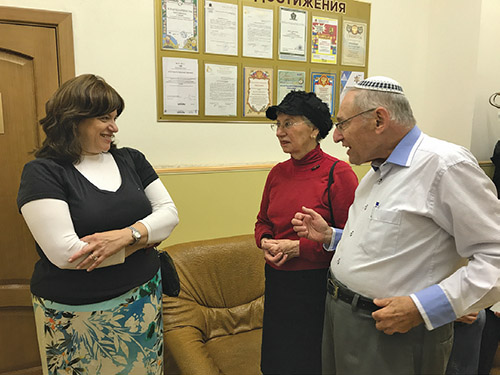

Rabbi Aaron Rakeffet and his wife Malkah are no strangers to kiruv in Russia. In fact, in the 1980s, while the Iron Curtain was up, they made multiple trips there on behalf of the Mossad, posing as Americans from Queens and traveling with American passports, even though they had made aliyah many years before, from the Bronx! They, and the 200 others they trained over 10 years, worked to keep the spark of Jewish life alive in synagogues and homes during Communist rule, when Jewish study and observing the mitzvot were strictly prohibited.
Shvut Ami was founded in the aftermath of the fall of the Iron Curtain, to help bring Jewish life back to the country. The Rakeffets were founding board members of the organization and they have been involved ever since. Rabbi Rakeffet is also known by the last name Rakeffett-Rothkoff, after Hebraizing his name upon his aliyah, and is Professor of Rabbinic Literature at Yeshiva University’s Caroline and Joseph S. Gruss Institute in Jerusalem. He is an extraordinarily well-known scholar, author, biographer and teacher. He was also a student of Rabbi Joseph B. Soloveitchik during the Rav’s prime teaching years, and is considered to have been the Rav’s first biographer, having written the two-volume series “The Rav: The World of Rabbi Joseph B. Soloveitchik,” among many other books and collections. Rabbi Rakeffet’s extremely accessible talks and shiurim are among the most downloaded on YUTorah.org.
In the 25 years since the curtain came down, Shvut Ami, and its worldwide fundraising partners, which include American Friends of Shvut Ami, headed by Bergenfield’s Rabbi Dovid Cofnas, have worked intensively to bring Jewish vibrancy and resources back to the former Soviet Union (FSU). While there are many hundreds of thousands of Jews in the FSU, the vast majority of whom are still unaffiliated, the Rakeffets bore witness in their trip last month to what they called a “miraculous resurgence” of Jewish life in Moscow, a city they last visited in the 1980s. Kosher bakeries, butchers and restaurants are now abundant, Jewish life and learning is progressing for both children and adults. The community is growing and alive with Jewish schools, Jewish weddings, brittot and other Jewish lifecycle events. Today there are 16 shuls in the city of Moscow alone.
Rabbi Rakeffet explained that there are three major kiruv communities working in Moscow: Chabad, under the auspices of Chabad Chief Rabbi Beryl Lazar (working with 60 percent of the affiliated Jews); 10 organizations under the auspices of non-Chabad Chief Rabbi Pinchas Goldschmidt that are assisted by Shvut Ami (approximately 30 to 35 percent); and the Bronnaya Synagogue Center under the auspices of Rabbi Yitzchak Kogan (5 to 10 percent).
Shvut Ami trains and places permanent rabbinic staff all over the FSU, and also trains and sends 25 shlichim (emissaries) annually who travel back and forth from Israel. Both groups act as teachers, rabbis and community leaders in whatever capacity required. The organization also provides schools with curricula, answers shailot, provides support to alumni and non-alumni alike and runs teacher-training seminars. “We are very proud to be able to say that almost 70 percent of the Russian staff of these 10 organizations were trained by Shvut Ami,” said Rabbi Cofnas.
To highlight just two of the 10 organizations: Shvut Ami’s teachers run Torah study sessions for Torah Mitzion’s “Stars” program, which “if you look at the picture [on a slide Rabbi Rakeffet was showing], you will see that the students look like every other Jewish boy in any American yeshiva,” Rabbi Rakeffet said. He added that many of them have had to go through brit milah as young adults due to the various issues with lineage and the glaring lack of ketubot that Russian Jews have experienced the result of, due to the Iron Curtain’s restrictions. Shvut Ami also runs a Yeshiva Birthright program to Israel that is designed to inspire future Jewish leaders in the FSU and to encourage aliyah.
Shvut Ami also provides staffing, support and advice to the Eitz Chaim School in Moscow, which has 600 students in K-12. The senior staff includes a non-Jew who makes sure that the school’s secular program is up to standard with the Russian secular school system. “She has such ahavas yehudi (love for the Jews), you wouldn’t believe it,” Rabbi Rakeffet said.
Rabbi Rakeffet explained that Shvut Ami’s efforts are only beginning, and there is an immense need to expand and continue the work. “In Moscow alone, where there are 250,000 Jews, only 15,000 to 20,000 Jews are being inspired and educated by all three communities together, accounting for a maximum of eight percent of the population,” said Malkah Rakeffet. “Now we can start to understand and appreciate why there is a close to 90 percent intermarriage rate. We have to do more. We are running out of time,” she said.
“Even though the Jews of the FSU are ‘out of sight and out of mind,’” said Rabbi Cofnas, “we have to remember that these are some of the most urgent and critical outreach efforts in the world right now. Ninety-five percent of the Jews that our teachers are educating have intermarried parents, but they have a spark of interest that, with God’s help, we have been able to nurture very successfully.”
“People sometimes ask me why I spend all my time fighting assimilation and intermarriage in the FSU when there are so many people on our home turf that need help,” said Rabbi Cofnas. “But the answer is simple. The Jews of the FSU had their heritage ripped away from them and now they want it back. They never had a choice so now we have a responsibility to help them.”
Rabbi Rakeffet asked the community to support Shvut Ami with donations so they can continue the critical work that is going on to bring back Jewish souls. For more information or to donate online, click here for Paypal (https://tinyurl.com/yctyk3eg) or please email dcofnas@shvutami.org or call 201-575-9080.
By Elizabeth Kratz













